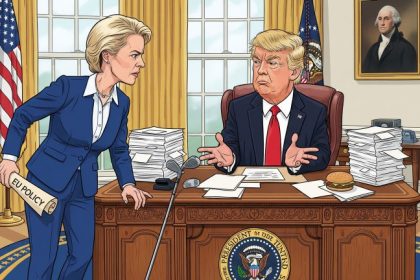Donald Trump has recently signaled a pause in his administration’s plan to impose tariffs on China for its continued purchases of Russian oil. The development comes just days after the U.S. President announced new, substantial tariffs on India over the very same issue, creating a stark contrast in policy towards the world’s two largest buyers of discounted Russian crude. This divergence in approach raises significant questions about the nature of U.S. foreign policy, the efficacy of sanctions as a tool of coercion, and the complex geopolitical chessboard where energy, trade, and strategic alliances intersect.
During a recent interview with Fox News, Trump stated that he does not see an immediate need for retaliatory tariffs on countries like China for buying Russian oil, but cautioned that such action could be taken “in two or three weeks.” His remarks followed a high-stakes meeting with Russian President Vladimir Putin in Alaska, which, while described by Trump as “very productive,” did not yield a breakthrough agreement to end the war in Ukraine. This temporary reprieve for Beijing stands in sharp relief to the new 25% tariff, raising the total duty on Indian exports to 50%, which is set to come into effect on August 27.
The India-China Conundrum
The disparate treatment of India and China in this matter is a central point of intrigue and debate. Both countries are massive buyers of Russian oil, stepping in to fill the void left by Western nations. However, while India has been singled out for what the Trump administration calls “fuelling Russia’s war machine,” China appears to have been granted a temporary exemption. The reasons for this are a source of much speculation.
One perspective is that the Trump administration is using a “divide and conquer” strategy. By penalizing India first, it may be trying to signal to other countries the potential consequences of continuing to trade with Russia. The hope, according to some analysts, is that India’s compliance will put pressure on other nations, including China, to follow suit. Trump himself has claimed that the tariffs on India have already influenced Moscow to seek a meeting, boasting that Russia has “lost an oil client, which is India.” India’s official stance, however, is that it has not halted oil purchases from Russia and that its decisions are based on national interests and energy security.
Another view, perhaps more cynical, is that the administration is simply using the issue as a bargaining chip in its ongoing negotiations with Beijing. Trump and Chinese President Xi Jinping are currently in talks to ease tensions and reduce import taxes between the two nations. Imposing massive tariffs on China for buying Russian oil would undoubtedly derail these sensitive discussions and could provoke a new, full-blown trade war. By holding back the tariffs, Trump may be keeping a powerful tool in reserve, waiting to see if he can extract concessions from China on other fronts, such as trade.
Russian Calculus
The U.S. policy also has significant implications for Russia’s economy. While Western sanctions have severely impacted Moscow’s financial and energy sectors, the continued demand for its oil from India and China has provided a crucial lifeline. Trump’s claim that Russia has lost India as a customer, if it were to hold true, would be a major blow to the Kremlin’s finances. The threat of similar penalties on China, Russia’s largest oil customer, would be even more “devastating,” as Trump himself acknowledged.
The temporary pause on tariffs for China could be a strategic move to see if the pressure on India, combined with the ongoing diplomatic discussions, is enough to get Moscow to the negotiating table on more favorable terms. The hope is that by applying pressure on one of Russia’s two largest customers, the U.S. can weaken Russia’s economic position without immediately resorting to the more drastic measure of directly targeting Beijing. However, this strategy is not without risks. It could alienate India, a key strategic partner in the Indo-Pacific, and could be seen by China as a sign of weakness or a bluff.
Geopolitical Chess: India’s Dilemma
For India, the situation is a significant test of its diplomatic and economic resilience. The looming 50% tariff on its exports to the U.S. is a severe penalty that could hit its economy hard. Indian officials have vehemently protested the move, calling it “unjustified and unreasonable.” They have pointed out the double standards, arguing that many European nations also continue to purchase Russian energy.
This crisis puts India in a difficult position, forcing it to choose between its economic interests and its strategic relationship with the U.S. While the U.S. is a crucial trading partner and a vital counterbalance to China in the region, India’s energy needs and its right to make sovereign decisions on trade are paramount. The situation is a powerful reminder that in the current geopolitical landscape, even seemingly straightforward trade decisions can have far-reaching political consequences.
Bigger Picture
Ultimately, the article’s title “Trump Eases Off China, Halts Tariffs for Russian Oil” is a reflection of a momentary pause in a much larger and more complex conflict. The U.S. is attempting to use its economic leverage to coerce and influence the behavior of other nations in a multipolar world. The outcome of this policy, however, is far from certain. It could succeed in isolating Russia, or it could lead to a fragmentation of the global economy, pushing nations like India and China closer together and further away from the U.S. As Trump himself said, he may have to “revisit the issue in two or three weeks,” suggesting that this story is far from over. The global chessboard is set, and the next few weeks will reveal the true nature of the U.S. strategy and the resilience of its rivals.




